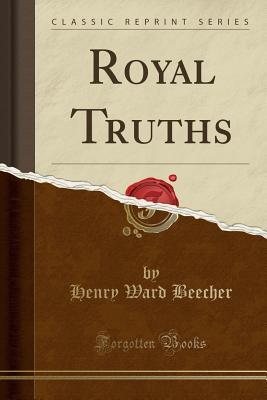- Bible
- Read the Bible
- Bible Versions
- Verse of the Day
- Reading Plans
- Verses by Topic
- Books of the Bible
- Bible Images
- Study
- Commentaries
- Concordances
- Dictionaries
- Encyclopedias
- Sermons
- Bible Atlas & Maps
- BP Wiki
- Devotionals
- Today's Devotionals
- Light of the World
- All Devotionals
- Inspirational Quotes
- More
- Picture Quotes
- Videos
- Inspirational
- Bible Study
- What The Bible Says
- Bible Q&As
- Daily Bread
- Bible by Genre
- Bible Stories
- Random Bible Verse
- Community
- Store
Royal Truths (Classic Reprint)
by Henry Ward Beecher
Excerpt from Royal Truths
When a musician is called to perform music which he has composed, before a great congregation, he knows that many will call for melodies, for ballads, for simple airs, and he may be. Disposed to gratify their taste; but if he knows that in the congregation there is one Mozart, or one Beethoven, who is able to follow him through all the intricacies of harmony, as he rises up to the majesties of sound that expresses thought, and feeling, and imagina tion, that one single musician will inspire him and re ward him more than the thousands of those who know only how to take in the lowest forms of his exhibition.
About the Publisher
Forgotten Books publishes hundreds of thousands of rare and classic books. Find more at www.forgottenbooks.comwww.forgottenbooks.com
This book is a reproduction of an important historical work. Forgotten Books uses state-of-the-art technology to digitally reconstruct the work, preserving the original format whilst repairing imperfections present in the aged copy. In rare cases, an imperfection in the original, such as a blemish or missing page, may be replicated in our edition. We do, however, repair the vast majority of imperfections successfully; any imperfections that remain are intentionally left to preserve the state of such historical works.
When a musician is called to perform music which he has composed, before a great congregation, he knows that many will call for melodies, for ballads, for simple airs, and he may be. Disposed to gratify their taste; but if he knows that in the congregation there is one Mozart, or one Beethoven, who is able to follow him through all the intricacies of harmony, as he rises up to the majesties of sound that expresses thought, and feeling, and imagina tion, that one single musician will inspire him and re ward him more than the thousands of those who know only how to take in the lowest forms of his exhibition.
About the Publisher
Forgotten Books publishes hundreds of thousands of rare and classic books. Find more at www.forgottenbooks.comwww.forgottenbooks.com
This book is a reproduction of an important historical work. Forgotten Books uses state-of-the-art technology to digitally reconstruct the work, preserving the original format whilst repairing imperfections present in the aged copy. In rare cases, an imperfection in the original, such as a blemish or missing page, may be replicated in our edition. We do, however, repair the vast majority of imperfections successfully; any imperfections that remain are intentionally left to preserve the state of such historical works.
BUY NOW
Paperback, 360 pages
Published January 2nd 2019 by Forgotten Books (first published January 28th 2014)
© 2026 Bibleportal.com All rights reserved.

Henry Ward Beecher was an American preacher and reformer, born in Litchfield, Connecticut. He was the eighth child of Lyman and Roxana Foote Beecher, and brother of Harriet Beecher Stowe.
Reared in a Puritan atmosphere, he has graphically described the mystical experience which, coming to him in his early youth, changed his whole conception of theology and determined his choice of the ministry.
It was in the pulpit that Beecher was seen at his best. His mastery of the English tongue, his dramatic power, his instinctive art of impersonation, which had become a second nature, his vivid imagination, his breadth of intellectual view, his quaint humor alternating with genuine pathos, and above all his simple and singularly unaffected devotional nature, made him as a preacher without a peer in his own time and country.
He was stricken with apoplexy while still active in the ministry, and died at Brooklyn on the 8th of March 1887, in the seventy-fourth year of his age.
... Show more